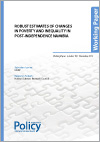
Robust Estimates of Changes in Poverty and Inequality in Post-Independence Namibia
Resumo:The authors estimate changes in the distribution of household consumption expenditure in Namibia since Independence in 1990 and the effects on poverty. To produce comparability between two household surveys, they use survey matching techniques and apply the framework of stochastic dominance to test the robustness of the results. The results reveal a significant decrease in the poverty headcount over the period and small but insignificant decreases in the country’s extremely high levels of inequality. Decomposition analysis shows that poverty reduction in Namibia is largely driven by growth in mean incomes rather than redistribution. Even so, there have been important changes in inequality, especially between different social groups, as educational attainment has replaced ethnicity as the main determinant of inequality between groups. (…)
Esta publicação também pode ser encontrada em um formato condensado e/ou expandido: